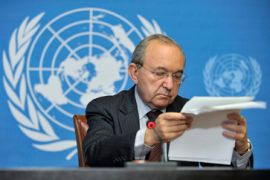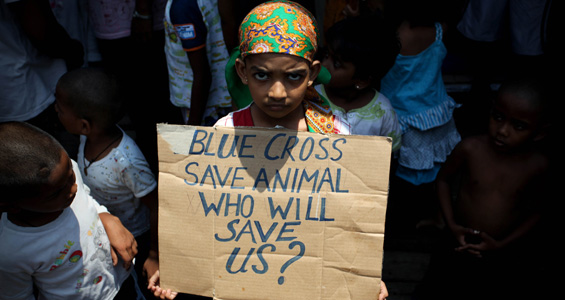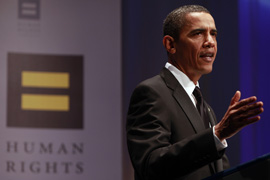2009: A year in human rights
Carroll Bogert, associate director of Human Rights Watch, looks back on a mixed year.

 |
| 2009 saw a range of international challenges that threatened people’s rights [GALLO/GETTY] |
With a new US president, international crises from Gaza to Sri Lanka, and continued political impediments to international justice, 2009 has been a busy year for those working in the field of human rights.
On Human Rights Day (December 10), Carroll Bogert, the associate director of Human Rights Watch (HRW), shares her views on some of the key moments of the past year and looks ahead to what 2010 might hold.
Al Jazeera: At the end of 2008, there was a tremendous amount of hope being invested in Barack Obama, the US president. But then there was the reality of Israel’s Operation Cast Lead in Gaza and the human rights issues that went along with that. What was HRW’s take on what happened in Gaza, and on the silence from the president-elect?
Carroll Bogert: I’m not sure that realistically we would have expected anything different from any US administration, since they certainly have a policy of avoiding any discussion of justice where Israel and the Middle East are concerned.
So that was not new, and I wouldn’t say we were surprised. At the same time, of course we were disappointed, because we think the only way to have a genuine peace process is [to have] one that is based on justice and recognition of crimes committed by both sides in Operation Cast Lead.
We were really disappointed that the rhetoric on the Goldstone Report was so sharp. They slammed the door on Goldstone. They could have done that differently, and I think it was a mistake.
What would you have liked to have seen done differently?
For the US administration to say it is extremely important that both sides investigate and punish the perpetrators of any war crimes or other serious violations of human rights in the context of the Gaza War. That’s not so hard to do.
This was the best opportunity not only to hold the Israel Defence Forces to account for what happened in Gaza, but also to hold Hamas accountable for what happened in Gaza.
That needn’t be seen, and shouldn’t be seen, as a threat to US objectives in the Middle East.
The year 2009 also saw the International Criminal Court (ICC) issue an arrest warrant for Omar Bashir, the Sudanese president. As soon as the warrant was issued, he responded by expelling aid agencies from Darfur. What’s more important; that international law is respected or that conditions on the ground are improved?
We don’t see those two things in opposition. There has been a false dichotomy between justice and peace in a case like Sudan, where if we go ahead and indict Bashir, then that’s going to be unhelpful to the actual realisation of human rights.
I don’t accept that. In other instances where heads of state indicted by the ICC or by other international bodies, like the [late Serbian president Slobodan] Milosevic case, or the Charles Taylor case, indictments were a way of stigmatising and putting a nail in the coffin of dictators. It’s been very effective in other cases.
Do you think human rights standards are being used politically?
By turning its back on justice in the Gaza situation, the international community is sending a signal that indeed, just as many African countries are arguing, this whole justice idea depends on the country committing the abuse.
The justice is not absolute, is not uniformly applied. Some countries get by, but not too many African countries. I don’t believe that the ICC is a biased institution, but I do think it’s a problem that the ICC’s docket is dominated by Africa, and I do think it’s a problem that efforts for justice by the UN, or anyone else, in the Gaza situation for example, get rebuffed, and blocked and don’t go forward.
How would you like to see this change, and what can you do bring about that change?
The Goldstone recommendations [say] that there have to be real and true judicial procedures on both Israeli and Palestinian sides, or if there aren’t, then some kind of international justice has to step in, has to become a player.
That’s what we think should happen. Will Israel and Hamas actually pursue perpetrators of serious human rights violations and bring them to account? We’ll find that out in 2010.
 |
| Human rights are often traded away in political negotiations, Bogart says [GALLO/GETTY] |
Another of the big stories of 2009 was the fallout from the Iranian elections. What is Human Rights Watch’s position on the response of the Iranian government to the opposition protests?
It’s a situation of grotesque human rights abuse. It’s only grown worse in this year.
Obviously we believe that Iran should cease detaining people, beating people, torturing people, executing people, trumping up trials against them etc.
The question is what to do about it, because the government is rather stubborn, and rather impervious to external pressure.
The thing we are concerned about is that the nuclear issue continues to dominate the international diplomatic agenda, and its important that as Obama tries to engage with Iran, if he does continue to do that in 2010, that he not lose sight of the human rights dimension and do a deal on nukes that entails less criticism of Iran on human rights grounds.
We don’t want the human rights agenda to be lost in nuclear talks.
Do you feel that this is what has happened with human rights issues in China, which is an important trading partner with Western countries? The Uighurs were the big story from 2009, but international criticism of the Chinese was muted.
I think that’s a perennial issue. There are an awful lot of human rights issues at play in China.
The Uighurs are certainly a part of that, and it must be noted that the US has recognised the repression that Uighurs face by not returning Uighur detainees from Guantanamo Bay to China because there is a serious threat of torture and abuse if they are returned.
There are a whole host of human rights issues in China that Obama did not address directly in his trip to China. It wasn’t that he didn’t raise human rights. He did raise human rights, but he raised it in an abstract way, saying “freedom of expression is good” without saying “freedom of expression is currently being violated by the Chinese government and that’s a problem”.
He wasn’t so unwise as to ignore the human rights question when he was in China, but I think he unwisely calculated that the US would be weaker, somehow, if he addressed those human rights concerns directly and bilaterally with the Chinese government.
How do you think Obama has handled some of his domestic human rights issues – Guantanamo Bay and Bagram for example? Has he lived up to expectations?
It’s a mixed picture. Definitely announcing the intention to close Guantanamo Bay and desisting from torture was positive.
The relish with which the Bush administration was using torture was just appalling, and I think incredibly damaging to American support of human rights in other contexts. So to announce that all parts of the US government would stop using torture was important. Obama deserves credit for that.
But Guantanamo is not going to be closed on time, and more importantly, they’re not closing Guantanamo, they are moving Guantanamo to Illinois.
They are continuing to hold some detainees without charge. Guantanamo is not a place, it’s an idea, and the idea is you can hold people without charge, which violates US constitutional law, and also international law.
What do you see as some of the major issues that are going to concern Human Rights Watch in 2010?
I think that the justice issue is going to continue to be paramount. As we’ve touched on, the Bashir indictment, the double standards represented by a lack of justice in a place like Gaza, or places like Sri Lanka, those double standards are very damaging to the cause of justice where we have managed to get indictments.
We’re going to struggle to bring those institutions of justice in better alignment with the reality on the ground.